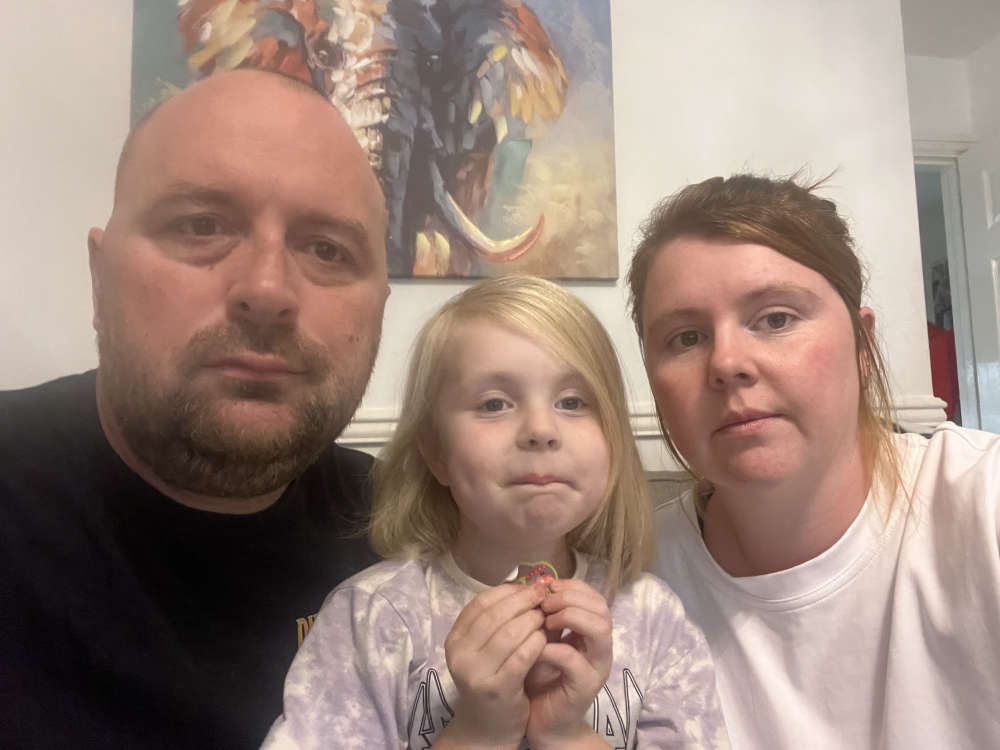
A six-year-old girl has been left out of school for months and missed the start of the academic year due to repeated “failings” from a Derbyshire council.
This comes as a new report shows Derbyshire County Council has paid out more than £84,000 in compensation to failed families following investigations by watchdog the Local Government and Social Care Ombudsman (LGO), including children being out of school for more than a year.
Harley Wilson, aged six, should have been starting Year 2 earlier this month but instead she remains at her Ilkeston home with mum and full-time carer, Hollie Sullivan, with support from dad, Jake.
Meanwhile her three-year-old sister, Teddie, is off enjoying pre-school and completely perplexed as to why her older sibling remains at home.
Harley, who is a big fan of swimming and trampolining, has been out of school and being taught from home by her mother, a former Derby Telegraph advertising rep, since May.
This followed her school hosting an emergency review of Harley’s education, health and care plan (EHC Plan) in February, after which it decided it could no longer accommodate her needs.
Ms Sullivan has been pursuing support in the form of an EHC Plan, a legally binding document which outlines educational support, since February 2023.
Since then, this process has become her unpaid full-time job, detailing a “hell bubble” of seemingly never-ending days of phonecalls, emails, voicemails, letters and meetings, all to end up seeing her eldest daughter out of school and spiralling fast into a mental health crisis.
It took eight months to complete an initial needs assessment and an entire year, until February 2024, for Harley to receive her final EHC Plan, meaning her school start was delayed by a year.
An EHC Plan is supposed to be completed in 20 weeks.
Harley is non verbal and autistic and will eat non-edible items, which all require specific expertise and monitoring typically unassociated with a mainstream school.
However, Ms Sullivan has been told that these requirements, while significant, are not burdensome enough to meet the criteria of a special school, due to the lack of further diagnosed conditions.
This leaves the family in a tight spot, with Ms Sullivan claiming Derbyshire County Council, which is responsible for all EHC Plans, is “failing” her daughter and many more children.
Ms Sullivan claims the authority wrongly believes that she chose to home educate Harley, but this is not the case and no alternative education has been provided since May and no wider support has been given.
A new report to be discussed by the county council next week shows the authority has received 1,013 complaints about children’s services in the past year, with 37 per cent upheld or partially upheld, but with responses only coming within agreed time-frames in 21.9 percent of cases.
Meanwhile, of the 55 upheld complaints to the LGO in the past year, 47 related to children’s services and the council’s initial proposed remedies were only deemed satisfactory in 31 percent of cases.
Ms Sullivan told the LDRS: “Every step of the process has been delayed. Harley was already set back a year because we did not have the EHC Plan on time and now she is not in school.
“They are failing her, they are all failing her.
“In all honesty, it is absolutely heartbreaking. My daughter is being let down and myself and for her, the mental health side is not good.
“She refuses to eat, she won’t come down from her bedroom, she won’t leave the house.
“It is at the point where, as a mum, I don’t know how to look after her. We don’t know what to do. She was so happy, but not anymore.
“It is not right, she is entitled to an education.”
Ms Sullivan is taken by surprise when our reporter asks how she is feeling, saying: “Nobody asks me how I feel, it is like a bubble of hell. I am exhausted of putting up a fight. I never think about how I am. I just want my daughter to go to school like everybody else.”
She said her former school struggled to accommodate Harley, choosing to teach her in a separate classroom from her peers, on her own, and she was not allowed in the playground with her friends and was instead confined to a gated-in section.
“It is an ongoing horrific battle and it shouldn’t be this hard.
“You just know everything you do is going to fail. Everything they try fails and nobody comes back to you when you complain.
“I have lost all hope. I just think, wow, it has been two and a half years and I know other families are going through it too, but it doesn’t help that this is my daughter who is not being supported.
“I will do everything I can to fight, to get someone to listen. They are failing her right to an education.
“She isn’t being home-schooled, she is in a black hole where nobody knows what she is doing.
“I have had enough of tiptoeing around. The whole thing is just not fair.”
Cllr Jack Bradley, the county council’s cabinet member for SEND and education, said: “We apologise to Harley’s family for the delays in securing an appropriate school place.
“Officers are continuing to consult to try to find a suitable school which is appropriate for Harley’s specific needs as quickly as possible which her family, the school and we as a local authority agree on and are happy meets her needs.
“SEND education is one of our most sensitive, important and complex areas of work and we have recently made significant investment in our services and are in the process of expanding specialist placements in both mainstream and specialist settings to ensure that all children and young people have a setting that can meet their needs.
“I’ve been taking a hands-on approach to improving support for children and young people with Special Educational Needs and Disabilities (SEND), visiting a wide range of schools across Derbyshire, including alternative provision settings, special schools, and mainstream schools.
“These visits span both academy and mainstream schools, offering valuable insight into the diverse educational environments across Derbyshire.
“The aim is to better understand the challenges faced by schools and families, and to identify practical ways to strengthen support for pupils with SEND.
“Being on the ground and seeing first-hand what life is like in our schools is vital. It helps us shape more effective, responsive policies and ensures that the voices of children, young people, and their families are at the heart of our decision-making.”


 Long Eaton project expected to receive share of East Midlands mayor's £25m investment fund
Long Eaton project expected to receive share of East Midlands mayor's £25m investment fund
 FREE parking to be available for ALL of December
FREE parking to be available for ALL of December
 Mayor delivers on pledge to boost tourism and investment in the East Midlands
Mayor delivers on pledge to boost tourism and investment in the East Midlands
 CCTV image released as part of investigation into knifepoint robbery at Ilkeston petrol station
CCTV image released as part of investigation into knifepoint robbery at Ilkeston petrol station
 Is an e-scooter on your Christmas list?
Is an e-scooter on your Christmas list?




